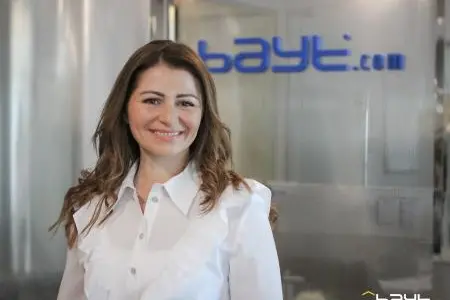PHOTO
Jordan: A new survey conducted by Bayt.com, the Middle East's #1 job site, and YouGov, market research agency, titled Ideal Workplace in the MENA, revealed that a whopping 89% of Jordan professionals say that their potential workplace should promote the use of advanced technology.
The survey reveals that perceptions of an ideal workplace are evolving quickly, with over half the respondents (56%) claim remote work option is an important aspect in their workplace.
What Matters Most to Jordan Professionals
In addition to seeking advanced technology, a challenging work environment is highly desired among respondents in Jordan. In fact, 78% of respondents feel having challenging work is an important factor. Furthermore, 81% of professionals believe that transparent communication is an important factor in any work environment.
Other elements that were considered important in a workplace include work life balance (81% say it is important), fair evaluation (81% say it is important), and innovation and creativity (86% say it is important).
Besides attractiveness, retention is an element that many organizations strive to master. When asked about factors that mostly drive loyalty, job security (38%) and opportunities for long-term career advancement (32%) emerged as key drivers of loyalty besides salary.
Ola Haddad, Director of Human Resources at Bayt.com said: “What professionals really want from their workplace is a great experience. Today’s workplace is an ecosystem, and the best workplace experiences are built on variety, choice, and autonomy. In our latest survey, we investigate the modern workplace and identify factors and design strategies that optimize effectiveness, experience, and performance.”
Business Values and Culture
In addition to workplace attraction and retention elements, respondents were asked about company culture and its impact when choosing a workplace. Nearly 6 in 10 respondents (57%) said that company culture is a determining factor when joining a company.
Jordan professionals look at a variety of elements relating to companies’ missions and impact on societies. When asked about business values that make a company more attractive, 55% cited good ethics and practices, 42% said friendly company culture, 26% said corporate social responsibility, and 12% said green consciousness / efforts.
Underlining the role of technology, 44% of respondents claim it is easy to access information about company culture and environment when applying for a job. Social media (27%), word of mouth (25%), and online company pages targeting job seekers (23%) are perceived as the best ways to promote company culture among job seekers.
To understand this issue further, respondents were asked about the most useful company information, to which 62% of Jordan respondents said company benefits and perks, 41% said employee testimonials and reviews, 22% said company events and socials, 22% said awards and milestones, and 8% said photos and videos of the workplace.
Physical Attributes
Not only do values and cultural elements matter to professionals, physical elements have a significant role as well. In Jordan, there seems to be a higher preference for larger companies, as 46% of respondents feel that an ideal company size has more than 50 employees.
In terms of office layout, closed rooms (31%), followed by open plan (21%), cubicles (17%) and workstations (5%) are the most preferred office layout plan.
Talking about interior design, 64% of respondents feel a workplace should have an attractive design/layout. In fact, 45% of employees claim the interior design of their office reflects their company’s brand and values, while 27% of respondents feel they were allowed to personalize their workspace.
Zafar Shah, Research Director, Data Services at YouGov said: “There is a direct link between a happy, engaged workforce and a successful business. Our latest survey identifies the biggest factors that employees deem are crucial to an ideal workplace. We explore the playing field that companies and reporting employees engage on, to help identify the ways in which companies can attract strong talent.”
Data for the Bayt.com’s Ideal Workplace in the MENA Survey was collected online from May 3 – 26, 2021. Results are based on a sample of 3,536 respondents. Countries assessed include UAE, KSA, Kuwait, Oman, Qatar, Bahrain, Lebanon, Jordan, Iraq, Palestine, Syria, Egypt, Morocco, Algeria, Tunisia, Libya, Sudan among others.
About Bayt.com
Bayt.com is the leading job site in the Gulf and Middle East, connecting job seekers with employers looking to hire. Every day, thousands of new job vacancies are listed on the award-winning platform from the region's top employers. The portal is used by over 40,000 global employers and has a database of over 41,000,000 professionals.
© Press Release 2021
Disclaimer: The contents of this press release was provided from an external third party provider. This website is not responsible for, and does not control, such external content. This content is provided on an “as is” and “as available” basis and has not been edited in any way. Neither this website nor our affiliates guarantee the accuracy of or endorse the views or opinions expressed in this press release.
The press release is provided for informational purposes only. The content does not provide tax, legal or investment advice or opinion regarding the suitability, value or profitability of any particular security, portfolio or investment strategy. Neither this website nor our affiliates shall be liable for any errors or inaccuracies in the content, or for any actions taken by you in reliance thereon. You expressly agree that your use of the information within this article is at your sole risk.
To the fullest extent permitted by applicable law, this website, its parent company, its subsidiaries, its affiliates and the respective shareholders, directors, officers, employees, agents, advertisers, content providers and licensors will not be liable (jointly or severally) to you for any direct, indirect, consequential, special, incidental, punitive or exemplary damages, including without limitation, lost profits, lost savings and lost revenues, whether in negligence, tort, contract or any other theory of liability, even if the parties have been advised of the possibility or could have foreseen any such damages.




















